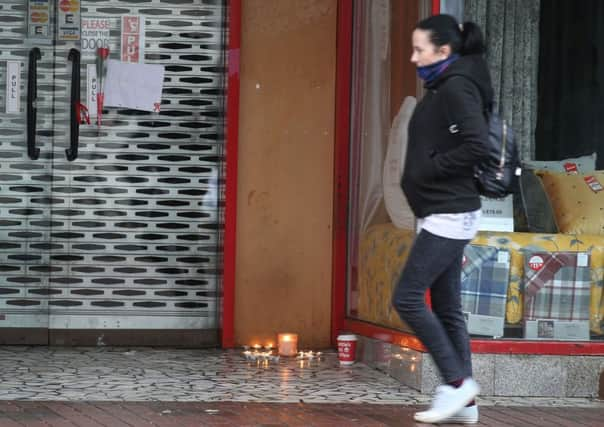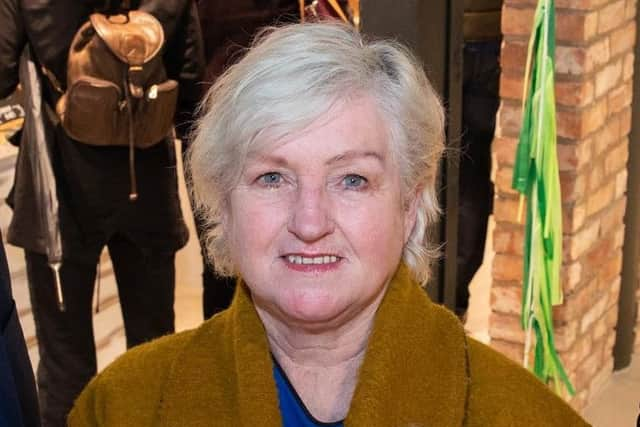Public don’t see all the death and tragedy


There was much public shock and anger after the rough sleeper – a man believed to be 27-years-old and originally from the Dublin area – was found dead in a shop doorway at High Street.
But according to those working to tackle homelessness in Northern Ireland, the heartbreaking reality is that the man’s death is “just the tip of the iceberg”.
Advertisement
Hide AdAdvertisement
Hide AdSandra Moore MBE, CEO of Belfast-based charity The Welcome Organisation, whose outreach workers discovered the man lying unconscious in the doorway and attempted in vain to resuscitate him, said homeless people in Northern Ireland are “dying day and daily”.


“The reason why this has been picked up is because it is a street death, but we would have people who are deemed to be homeless in hostels and in hospital dying day and daily,” she said.
“The number of deaths within the homeless population would be high. And the life expectancy for a rough sleeper, for a male it’s 45 - that’s about 32 years younger than a male in the settled population. For females it’s now something similar.”
Kevin Bailey, the Simon Community’s director of homelessness services, said deaths among Northern Ireland’s homeless population are increasing, adding that they “happen more and more regularly now both on the street and in temporary accommodation projects”.
Advertisement
Hide AdAdvertisement
Hide Ad“Ultimately what the public see is the thin end of the wedge. When people die in doorways it is visible and can be seen, but what the public don’t see and don’t know about is all the other deaths and all the other tragedies that occur while living in temporary accommodation, given all the range of issues around drug and alcohol misuse, addiction issues, physical and mental health issues and the lack sometimes of statutory service provision or access to the right help and support when you have such high and long waiting lists,” he said.
Welcome Organisation staff conducted a “street count” before Christmas and there were 15 people sleeping rough in Belfast city centre, but Ms Moore says the number varies night by night and stresses that the number of people who are “homeless” is significantly higher.
Indeed, according to Northern Ireland Audit Office figures, the number of people deemed homeless here increased by 32% between 2012 and 2017, to nearly 12,000 individuals and families.
Responding to claims that no one in Northern Ireland has to be homeless, she said while there are often empty beds in temporary accommodation, “they are not necessarily the appropriate beds or accessible” for people who are often very vulnerable and may have physical and mental health issues and addiction problems.
Advertisement
Hide AdAdvertisement
Hide Ad“Drugs are becoming an increasing issue,” she continued. “The big challenge used to be alcohol use, but now the biggest challenges for us to deal with are mental health issues, drugs and often alcohol as well.”
The Simon Community is Northern Ireland’s largest homelessness services provider, offering 369 beds every night of the week.
Demand for its services is increasing, from people from all walks of life including more and more young people.
Shockingly, 37% of the Simon Community’s existing clients are in the 16 - 25 age bracket, and many of them have complex problems such as addictions and mental health problems.
Advertisement
Hide AdAdvertisement
Hide AdMr Bailey believes overcoming the homelessness crisis is a winnable battle, but says it will require “a lot of work, dedication and specific direction from government”, including the return of a functioning Assembly.
“Homelessness is an issue that knows no boundaries. It doesn’t make a difference whether you are young, old, black, white, rich or poor. Anybody can be impacted by homelessness,” he said.
“Unfortunately deaths of individuals who are experiencing or at risk of homelessness have been increasing over the past year. We have no Assembly, we have limited coordination between a range of organisations to stop this homeless crisis that we are currently experiencing.
“The reality is we need the Assembly back, we need joined up working, we need better resources that are targeted at individuals to help them out of this homeless crisis otherwise we will continue to see more and more people dying, not only on the streets but in temporary accommodation.
Advertisement
Hide AdAdvertisement
Hide Ad“We have a Programme for Government that needs enacted, it needs resourced properly and it needs organisations to really target the resources at those most vulnerable in our society otherwise you are going to continue to get the same traits over and over again.”
Agreeing that the stalemate at Stormont isn’t helping the situation, Ms Moore said: “We would agree that the parties need to get back to governing. No decisions are being made on the important issues, either by civil servants or secretary of state. The transitional funding issue is a prime example; people are experiencing real poverty and stress while around 60% of relief funding isn’t spent. Obviously the correlations between poverty and homelessness are very strong.”
Tony McQuillan, director of Shelter Northern Ireland, said the number of people sleeping rough in Belfast city centre is “quite low” compared to other cities across the UK. But he described the situation as the “very small tip of a very large iceberg”.
Stressing that the problem is not always down to homelessness, but often issues regarding mental health and addiction, he said the charity will continue working to help those in need.
Advertisement
Hide AdAdvertisement
Hide Ad“We all want to eliminate sleeping rough, but it is a very difficult problem to deal with. Despite all the good attempts people have made to address it, it appears to be a very intractable issue. But we would certainly be very keen to see it eliminated,” he said.
Police say a post mortem examination has been carried out on the body of the young man found dead in High Street, but they are still awaiting the results of further tests in order to establish the cause of his death.
• The Welcome Organisation, Belfast can be contacted on 028 9024 0424.
• The Simon Community helpline number is 0800 171 2222.
• Shelter Northern Ireland can be contacted on 028 9024 7752.